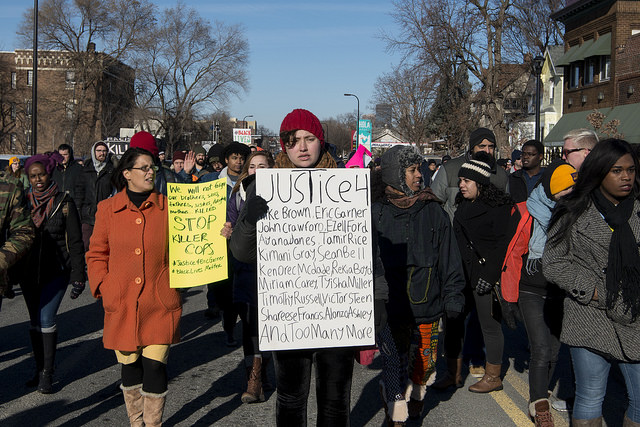
Black Lives Matter protest in south Minneapolis flickr user Fibonacci Blue / Creative Commons
Note: This post was edited in June 2020 to add more nuance from learning how to follow Black-led movements. - Editor
I am a white person who recently participated in #millionsmarchnyc as part of #BlackLivesMatter. As a queer, gender-queer person, I know about some forms of oppression, but I didn’t want my own unconscious racism, entitlement, and unexamined privilege to perpetuate the pathology and systems we were there to protest. So I came up with some guidelines for myself while participating in public demonstrations against racism and police violence.
One thing I’m figuring out is that it is important for me as a white person showing up in support to engage in anti-racism work with other white people. Racism is a white person problem, not a Black person problem. We as white people need to be talking to each other about it. So with that in mind, I feel led to share my personal guidelines and am open to any feedback.
Tell elected officials: Invest in communities, not policing!
Note to self:
1. Remember that you are there as support and in solidarity—it’s not about you.
No matter how outraged or indignant you feel, a Black person will still have different feelings. Respect and be present to differences in emotion, experience, and politics. Consider that your role might be as a witness and support to others’ expressions rather than expressing your own feelings.
2. Don't provoke or antagonize police with your words or deeds.
If police respond with violence and arrests, the people of color in your demonstration will face much harsher repercussions than you will. Putting them at risk is itself a form of privileged violence. Organizers from the Black community need to set the tone of the action.
3. It is not your job to police or tone down Black protesters who have a right to express anger.
Support the leadership of the Black organizers. If you cannot support what they are saying or doing, it’s OK to leave and find a different way of working on anti-racism, but keep in mind that their approaches arise from their direct experience of day-to-day oppression.
4. If you have a smartphone in your pocket, use it to lift up the voices of Black people involved in the struggle.
Post photos and videos of the action on social media, with permission. Keep in mind that doxing (publishing personal details with the intent to harm) and targeting of activists is common, so only post with permission. Do post publically shared photos and words posted by Black activists that they have chosen to make public. Document police presence and interactions. You are allowed one selfie and that is it. Do not be the white person who fills their social media with self-congratulatory photos of themselves at the demonstration. Black people are not trophies.
5. Don't lead chants.
Make room for the Black people around you to lead chants. Support them with your voice and rhythm. Pay attention to the impact of who and what you are supporting and doing. Some words are not yours to say.
6. Anticipate that reporters may seek you for a comment out of their own unconscious racial bias.
Before a demonstration begins, try to find out who are the designated media spokespeople. If a member of the press approaches you, here is your talking point: “I am here to support and offer solidarity to the Black community,” then direct them to a spokesperson. For example, a reporter comes up to you and asks what you think of the grand jury system. Your answer is: “I am here in solidarity with the Black community.” A TV station shines the camera on you and asks, “What do you think the militarization of policing will do to First Amendment abuses against peaceful protests?” You say: “I am here in solidarity with the Black community.” In order to do this you have to accept that members of the Black community will be more informed and better able to talk about these issues than you.
7. Don't hijack the message.
Do not say, “All Lives Matter,” ever. The problem is that in our society, Black lives are valued less than white lives. Chanting “All Lives Matter” at a “Black Lives Matter” protest is like going to a funeral and telling the bereaved, “Hey, Everyone Dies.” If you are part of some other marginalized group, it’s OK to show up as your whole authentic self, just don’t make it all about you. Being queer, I felt okay putting a rainbow on my Black Lives Matter sign as a way to represent my community, but I didn’t make the message Queer Lives Matter Too. Just because something else also happens to be true does not mean it needs to be the focus of this action. You wouldn’t run through an AIDS fundraiser with a Breast Cancer sign. Don’t use the Black Lives Matter actions to push your own agenda, no matter how noble.
8. Be responsible for yourself.
Educate yourself about the organizations, leaders, and issues that are represented at the event. Don’t participate in direct action unless you have been trained by the organizers to do so. Carry your own water, food, money, and phone. Write important phone numbers on your body so you can’t lose them. Have a plan in place with people at home to support you if necessary. Don’t expect action organizers to take care of your needs—they have their hands full already.
9. Stay involved after the event is over.
It is important to attend major events and marches to show solidarity, but it is even more important to stay active afterward. Remember that racism needs to be dealt with in white communities, so join with other white people to do our own work. Don’t ask black organizers what you can do to help unless you are prepared to actually show up and do that thing. Be humble if your offer is received with skepticism and try to understand why that might be.
